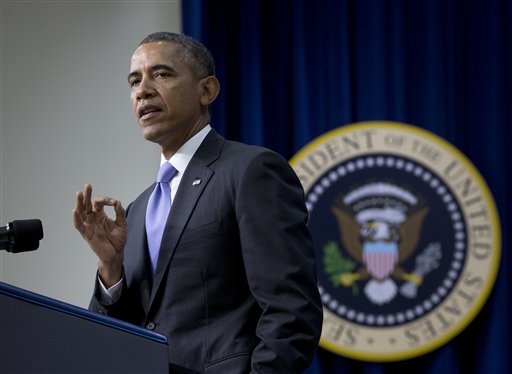Questions and answers about Obama’s new NSA rules

President Barack Obama speaks in the South Court Auditorium in the Eisenhower Executive Office Building on the White House complex, Thursday, Jan. 16, 2014, in Washington. AP
WASHINGTON — President Barack Obama is ordering changes to spy programs that sweep up Americans’ phone records and store email and Internet data from around the world, seven months after former NSA analyst Edward Snowden began divulging secret methods of the National Security Agency. If enacted by Congress, it would mean significant changes to the bulk collection of communications.
Here are some questions and answers about Obama’s plan:
Q: What about spying on world leaders?
A: In response to criticism from around the globe, Obama is making assurances that the U.S. won’t spy on its allies’ heads of state. But the White House declined to say which world leaders are on that “friends” list. Obama said other countries, including some who have complained about the NSA, constantly try to snoop on the U.S. government’s phone calls and email. Obama says there are compelling national security reasons for snooping on foreign governments and the U.S. won’t apologize for being better at it.
Q: What about the phone calls and emails of people living abroad?
A: Obama says the U.S. should respect the privacy of non-Americans, too. He said he will extend to foreigners some protections against spying that apply to U.S. citizens. He’s directing Holder and Clapper to develop new restrictions on how long the U.S. can hold data collected overseas and how that data is used.
The U.S. won’t spy on ordinary people who don’t threaten U.S. national security, Obama says.
Q: What happened to Snowden?
A: Snowden fled the country before his revelations became public. He is currently living in Russia, granted temporary asylum from the criminal charges he faces in the United States for disseminating classified information.
Some supporters call him a hero and want Obama to grant him amnesty or a plea deal. The White House has dismissed those notions.
“I’m not going to dwell on Mr. Snowden’s actions or motivations,” Obama said Friday. “I will say that our nation’s defense depends in part on the fidelity of those entrusted with our nation’s secrets.”
Q: Why did Obama decide to alter the surveillance programs?
A: The president has been under pressure since Snowden took an estimated 1.7 million documents from the National Security Agency and gave them to journalists around the world. Some in public, Congress and allies overseas were shocked to learn the extent of the NSA’s post 9/11 surveillance. In the immediate aftermath of Snowden’s disclosure in June, Obama promised to review the system. On Friday, he defended the work of the U.S. spying apparatus as necessary to protect Americans and the nation’s allies. But he said at a time of rapidly changing technology it’s important to ensure that privacy and civil liberties are protected.
Q: Will these changes be immediate now that the president has ordered them?
A: No. Many of the changes involve altering the USA Patriot Act, a law enacted by Congress, and any changes to that would require new legislation and congressional approval. And now the work turns to lawyers who will have to determine what other changes require Congress approval, and what Obama can simply order be done. Even administration officials were uncertain Friday what he could immediately change.
Q: What could happen to my phone records?
A: For now, the NSA will keep collecting and storing phone data, including the numbers called and the length of conversations, but not what’s said.
Obama says the NSA should be able to tap into those records when it needs to find people linked to suspected terrorists. But he wants the government to store the records elsewhere, even though most phone companies have balked at the idea of storing them themselves.
Obama says the program as it now exists will be ended over time.
Q: So where will my records be stored?
That’s not yet decided. Obama told Attorney General Eric Holder and Director of National Intelligence James Clapper to find a solution within 60 days, about the time the NSA surveillance programs are up for their regular reauthorization. That could mean arranging for phone companies to store the records, creating a new third-party entity to hold them, or coming up with some other plan.
In the meantime, Obama ordered two immediate changes:
—He will shrink the length of the connections surrounding a suspect that can be checked, to two steps away from a suspected terror organization. Now the limit is three steps away.
—The administration will require a judge’s advance approval before intelligence agencies can examine the data. Now, the NSA could decide whether it had enough evidence to run a query on a suspect.
Q: What about the NSA reading my email and watching me online?
A: The bulk collection of online data is supposed to be targeted only at people outside the United States, but it does end up sweeping up information about Americans in the process. Obama asked Holder and Clapper to consider whether new privacy safeguards could be added.
RELATED STORIES:
NSA spying threatens to hamper US foreign policy
France is latest US ally angered by NSA snooping